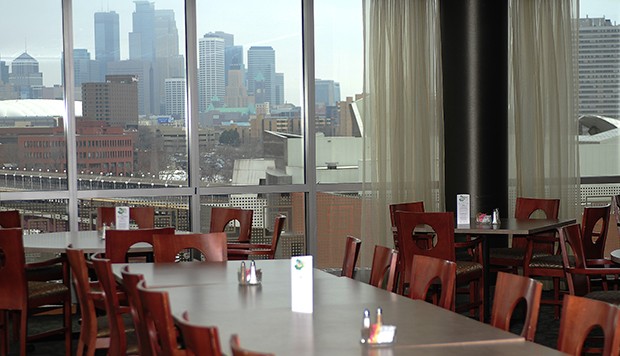
 Sam Black worked at the Minnesota Daily as a reporter and editor from 1994 to 1997. After spending three years at the Grand Forks (N.D.) Herald, he joined the Minneapolis-St. Paul Business Journal in 2000. Today Sam is senior reporter at the Business Journal where he reports on real estate, manufacturing and food companies in addition to overseeing the paperâÄôs newsroom internship program. Sam and his wife Christina, have two young sons, Levi and Ezra.
Sam Black worked at the Minnesota Daily as a reporter and editor from 1994 to 1997. After spending three years at the Grand Forks (N.D.) Herald, he joined the Minneapolis-St. Paul Business Journal in 2000. Today Sam is senior reporter at the Business Journal where he reports on real estate, manufacturing and food companies in addition to overseeing the paperâÄôs newsroom internship program. Sam and his wife Christina, have two young sons, Levi and Ezra.Every spring, the UniversityâÄôs Campus Club has a contest to guess when its fourth-floor patio at Coffman Memorial Union will officially be habitable. It takes 10 people having lunch simultaneously on the terrace to reach critical mass. The correct guesser will win a free lunch. For each of the past six years, itâÄôs been a good bet to pick the third or fourth week in April. This year, however, the challenge might have as much to do with the weather as to guessing when the economy will pick up enough to fill the patio. Like restaurants and hospitality venues all over the country, the Campus Club isnâÄôt immune to the economic recession. Ann Holt, executive director of the club, said sheâÄôs predicting a 20 percent decline in the clubâÄôs 2010 budget. Revenues were $1.8 million last year. To adapt to the decline, the club is trying to find ways to streamline its operations, Holt said. It may also cut some of its 50-person staff by not re-filling jobs as employees âÄî most of whom are students âÄî depart. The private, nonprofit club has 1,560 members who are faculty, staff, alumni, students and friends of the University. ThatâÄôs up from 1,300 in 2003. Since the start of this year, membership has declined about 20 percent, Holt said. But despite the drop, sheâÄôs not worried. The club is looking forward to celebrating its 100th anniversary in two years. âÄúWe may shrink a bit through this recession, but the club isnâÄôt in danger of closing or not being able to fulfill its function on campus as a community gathering place for social and business functions,âÄù she said. Combating elitist image, Phil Platt, marketing and membership director at the club, said last month several retirees quit their memberships, presumably for financial reasons. Platt said heâÄôs unsure about how potential budget cuts might hurt membership and revenues in certain departments and ripple down to the club. âÄúWeâÄôll just have to wait and see,âÄù he said. A big portion of the Campus ClubâÄôs revenues come from its restaurant and from end-of-semester departmental get-togethers that rent space. Platt claims the restaurant is the best food at the best price for miles around the campus. The daily lunch special is $10.50 plus beverages. The club has a full bar, which all staff and faculty can use during the summer, its slowest season. Members pay to rent space for meetings and special events such as departmental get-togethers, work retreats and private anniversary parties or weddings. The biggest misconception about the Campus Club is that it is elitist, Platt said. He acknowledges that the clubâÄôs roots were not inclusive, as only male professors were allowed to join until the late 1950s. To help offset this perception, the club does some outreach by giving away free mint iced tea in the summer at a farmerâÄôs market on Church Street. It also regularly donates meals and other things to causes around the University. Platt said he also bends over backward to make people feel welcome when they come through the door, either as a member, guest or prospective member. Membership dues for full-time faculty, staff and students are $189 per year. Dues are $120 for retirees and $300 for alumni and parents. Corporations can join for $1,200 per year. Platt is responsible for promoting special activities that make the club valuable for its members. Upcoming include Scotch whisky-tasting and an Easter brunch. On March 8, the club and the Slow Food Minnesota organization will co-host a dinner and sponsor a presentation at the club by Minnesota Public Radio host Lynne Rosetto Kasper. All of the events are designed to keep members engaged. Membership doesnâÄôt come with access to an exclusive golf course, spa or workout facility. It just comes with the access to a nice, on-campus retreat where diverse, intelligent and interesting people get to interact with each other, Platt said. âÄúWeâÄôve got nuclear physicists. WeâÄôve got rocket scientists. WeâÄôve got brain surgeons, art historians and epidemiologists âÄî the full spectrum,âÄù he said. âÄúThereâÄôs never a dull moment here.âÄù


